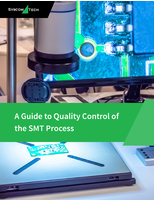Flash Microcontrollers include 32 Kbyte memory devices.
Press Release Summary:

Available in 64- and 80-pin TQFP packages, Models PIC18F6520 and PIC18F8520 feature PMOS Electrically Erasable Cell (PEEC) process technology, which provides erase/write endurance, retention, and disturb reliability for both program and on-chip data EEPROM memory. Peripheral set includes analog-to-digital converter with up to 16 channels x 10-bit resolution, 5 Capture/Compare/PWM modules, up to 10 MIPS performance at 10 MHz, and various timers.
Original Press Release:
Microchip Technology Expands Family of High Pin-count PICmicro® Microcontrollers to Include 32K Flash Memory Devices
CHANDLER, Ariz., May 19, 2003 [NASDAQ: MCHP -Microchip Technology Inc., a leading provider of microcontroller and analog semiconductors, today announced that it has expanded its popular PIC18F family of Flash microcontrollers in 64- and 80-pin TQFP packages to include a low-cost 32Kb memory device. Ideally suited for applications requiring a large memory, the large pin-count PICmicro® microcontrollers offer designers added I/Os, timers, a feature-rich peripheral set and the flexibility of field self-programmability. The PIC18F6520 and PIC18F8520 microcontrollers feature Microchip's PMOS Electrically Erasable Cell (PEEC) process technology, which provides best-in-class erase/write endurance, retention, and disturb reliability for both program and on-chip data EEPROM memory.
The PIC18F6520 and PIC18F8520 microcontrollers are code-compatible with Microchip's PIC18F452 and PIC18F8720 families of Flash devices, enabling designers to re-use software and hardware in existing platforms, thus lowering overall development costs and time-to-market issues.
By migrating to the new devices, users of Microchip's PIC18F452 devices retain the large 32Kbyte memory and receive the added benefit of the analog and digital peripherals and connectivity options of the high pin-count devices. Current users of the PIC18F8720 family have the ability to migrate to a smaller memory microcontroller at a lower cost without forfeiting any of the analog or digital features or connectivity options.
Users of Microchip's one-time programmable (OTP) PIC17C7XX devices have the benefit of being able to migrate to a microcontroller that features the same analog and digital peripherals and connectivity options as the OTP device, but offers the flexibility of a reprogrammable Flash memory device.
The PIC18F6520 and PIC18F8520 feature 32K bytes of Flash memory, 2K bytes of RAM memory and 1024 bytes of high endurance EEPROM data memory. The feature-rich peripheral set includes an analog-to-digital converter (ADC) with up to 16 channels x 10-bit resolution, 5 Capture/Compare/PWM modules, up to 10 MIPS performance at 10 MHz, two 8-bit timers, three 16-bit timers and one watch-dog timer (WDT), dual analog comparators and a parallel slave port (PSP). Additional features include an operating voltage range of 2.0-5.5 volts, programmable brown-out detection/reset (PBOR), programmable 16-level Low Voltage Detection module (PLVD), 32 kHz secondary oscillator clock input and a 4x phase lock loop (PLL) for high-frequency oscillators. Serial I/O features include SPI(TM), I2C(TM), and two addressable USART modules supporting RS485 and RS232.
The devices offer cost effective solutions for general-purpose applications, such as automotive (instrument cluster panel controller), consumer (washing machine controller interface, furnace controller), industrial (power monitor, industrial motor control) and telecommunications (routers, phone line switching card, fiber optic multiplexer) industries. Samples and volume production are available now. For additional information, contact any Microchip sales representative or authorized worldwide distributor or visit www.microchip.com.
Development Tools
Microchip's PIC18FXX20 TQFP 64- and 80-pin demonstration board shows the functionality of the digital and analog peripherals of the high pin-count PIC18F microcontrollers and complements the MPLAB® In-Circuit Debugger (ICD) 2 tool. The MPLAB ICD 2 development tool is a powerful, low-cost run-time tool that offers cost-effective in-circuit Flash programming and debugging from the graphical user interface of the MPLAB Integrated Development Environment (IDE) tool. This enables a designer to develop and debug source code by watching variables, single-stepping and setting break points. Running at full speed enables testing hardware in real-time.
About Microchip Technology
Microchip Technology Inc. manufactures the popular PICmicro® field-programmable RISC microcontrollers, which serve 8- and 16-bit embedded control applications, and a broad spectrum of high performance linear and mixed-signal, power management and thermal management devices. The Company also offers complementary microperipheral products including interface devices; microID® RFID devices; serial EEPROMs; and the patented KEELOQ® security devices. This synergistic product portfolio targets thousands of applications and a growing demand for high-performance designs in the automotive, communications, computing, consumer and industrial control markets. The Company's quality systems are ISO 9001 (1994 version) and QS9000 (1998 version) certified. Microchip is headquartered in Chandler, Arizona with design facilities in Mountain View, California, Bangalore, India; and a European Design Center in Lausanne, Switzerland; semiconductor fabrication facilities in Tempe and Chandler, Arizona; Gresham, Oregon; and Puyallup, Washington; and assembly and test operations near Bangkok, Thailand. Microchip employs approximately 3,350 people worldwide and has sales offices throughout Asia, Europe, Japan and the Americas. More information on the Company can be found at www.microchip.com.
Note: The Microchip name and logo, PIC, PICmicro, microID, MPLAB and KeeLoq are registered trademarks of Microchip Technology Inc. in the USA and other countries. I2C is a trademark of Philips Corporation. SPI is a trademark of Motorola. All other trademarks are the property of their respective owners.




